Thanks to Iman for jogging my memory about this blog post which I’d been meaning to blog about for the last couple of weeks — in fact, I was chatting to someone after the ARCLib Conference in Liverpool last week about it, but couldn’t remember the name of the library for the life in me (it’s the Emily Carr University Library)…

The above was a senior grad project by Valérie Madill and you can find further details here: “Looking at Libraries: Defining Space Through Content“.
During my ARCLib presentation (which bizarrely ended up as a featured slideshow on the slideshare home page!?!), I mentioned the book shop in San Francisco that Chris Cobb famously rearranged by colour (see Flickr)…

I must briefly mention that the last session of the conference was given by Stephanie Davies of laughology.co.uk. I don’t think I’ve ever laughed so much at a library conference 😀
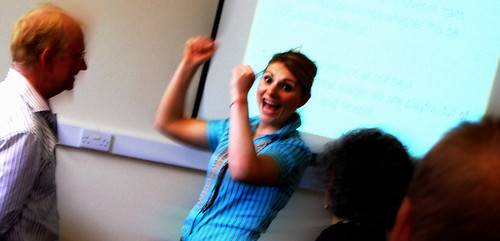
Just in case anyone didn’t believe me that there’s a web page with a list of dirty library words, it’s here!
I’m itching to do something cool on one of our library’s plasma screens and I was wondering about hooking it up to a webcam and doing something like this, but using book cover thumbnails instead of the square blocks of colour?

I think I’ve still got the code I used to creating the “librarians as books” kicking around somewhere…

Month: July 2008
Hot Stuff is cooling down
Dewey Blobs
I’ve been fascinated by data visualisation for a year or two now, and I’ve recently been chatting to my good friend Iman about doing something with our circulation data. In particular, something that will be visually interesting to look at, whilst also giving you a feel for the data.
I’ve tried a few different things, but the Dewey Blobs are currently my favourite…

(items borrowed on 23rd June)
The transactions are placed on a 32×32 grid based on their Dewey classification (000-999). Each transaction is shown as a semi-transparent circle with two attributes:
1) colour — based on the School the student making the transaction studies in
2) size — based on the popularity of the book (the larger the circle, the more times it’s been borrowed before)
Where many students from the same school borrow from the same Dewey classification on the same day, the colour is reinforced. If the borrowing is from multiple schools, then the colours begin to blend to create new hues.
For example, on this day the vast majority of transactions in the 300s were by Human & Health students (green)…

…but a couple of days later, the borrowing in the 300s is more complex, with students from several schools appearing (Business students are red and Music & Humanities students are blue)…

You can browse through a few of the blobs on Flickr.
17 years too late — it’s “Bridge to the Stars”!
Regular readers will probably know that I used to be in a band (“The Headmen”) in the early 1990s. Thanks to Facebook, I’m back in touch with Simon, the singer/songwriter, and we’ve been busy converting all of our old cassette tapes to MP3.
I’m so used to “digital” now that’s it strange to think that all of our studio recordings were done on reel-to-reel magnetic tape. The only time the word “digital” was ever mentioned was when the final studio mixes were sent off on a tiny DAT (Digital Audio Tape) to get pressed onto vinyl.
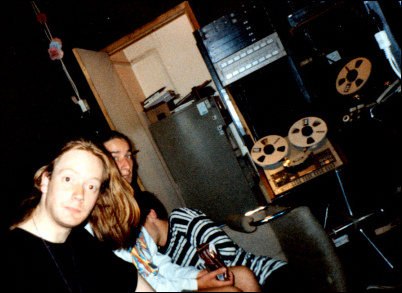
(L-R: Dave, Matthew, and Simon)
Anyway, back in 1991 we recorded what was going to be the follow-up EP single to the “Reach the Sky” EP — “Bridge to the Stars”. “Reach the Sky” had got good airplay during the summer, even sneaking onto Radio One’s playlists…
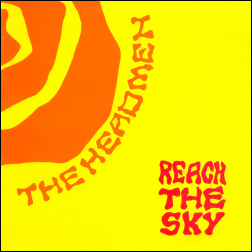
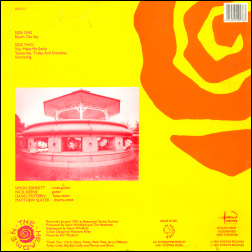
Sadly, “Bridge to the Stars” never got released. Not too long after the tracks got their initial mix, Beaumont Street Studios in Huddersfield was destroyed in a fire and all of our master tapes went up in smoke. The following year we parted company from Positive Records and, a couple of years later, played our final gig as part of Bradford Festival 1994.
Only 3 people were present for that initial mix — Steve Whitfield, our drummer Matthew, and myself. At the end of the evening, Matthew and I walked away with a cassette tape each of the mixes. Within a couple of weeks, I’d lent my copy to someone and never saw it again.
Fortunately, Matthew was a little more careful with his copy and, only 17 years too late, I’m proud to give the EP a semi-official release!
1. Bridge to the Stars
[audio:https://daveyp.com/files/headmen/bridge/01%20-%20Bridge%20to%20the%20Stars.mp3]
2. We All Fall Down
[audio:https://daveyp.com/files/headmen/bridge/02%20-%20We%20All%20Fall%20Down.mp3]
3. Weird
[audio:https://daveyp.com/files/headmen/bridge/03%20-%20Weird.mp3]
4. Song 52
[audio:https://daveyp.com/files/headmen/bridge/04%20-%20Song%2052.mp3]
The tracks are also available on Last.FM.
Listening to the tape, it blew away a serious amount of cobwebbage — I had to listen to “We All Fall Down” 3 times before I could even remember playing bass on it!
When we went into the studio, “Song 52” was a new song to me and one that I really struggled to get to grips with quickly. In the end, Simon had to stand next to a flipchart and guide me through the song whilst I played the (fairly minimal) bassline — “V C 8” standing for “verse”, “chorus”, and “middle 8″…
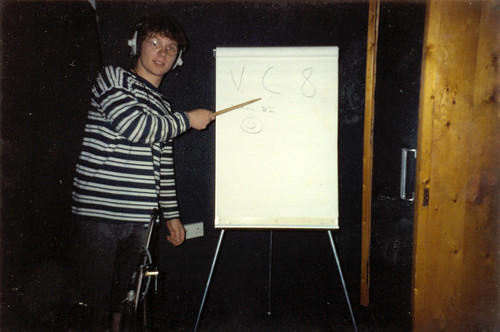
(Simon’s telling me to play the chorus!)
“We All Fall Down” features some “more cowbell” 😉 The cowbell, which I think was clamped to a chair in the studio, kept coming loose, so I ended up risking life and limb by holding it steady for Matthew to thwack…
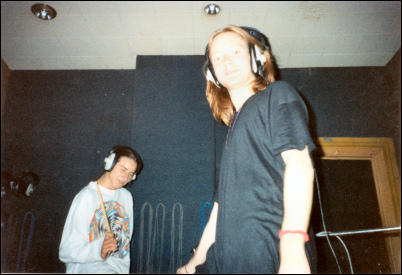
(sadly, the cowbell was just out of shot in this photo)
I remember there was even talk about filming a cheesy video for “Bridge to the Stars”, with cardboard cutout spaceships and tinfoil spacesuits.
At the time, both Simon and I worked at the Tesco supermarket in Brighouse and, one lunchtime in the staff canteen, Simon doodled the artwork for the EP. As you can see, I then managed to spill my coffee over half of it!!!
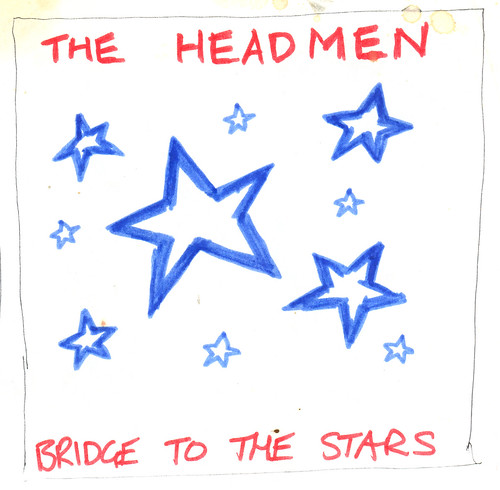
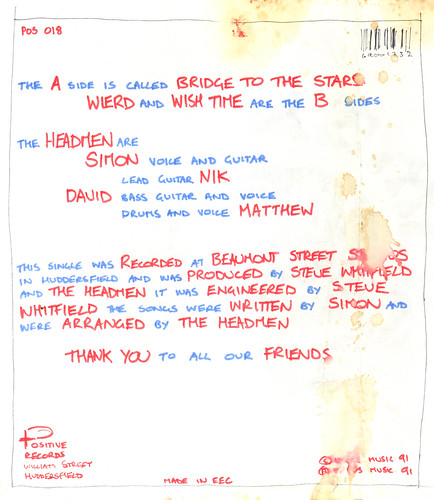
Curiously, the artwork doesn’t mention “We All Fall Down” and I’m guessing “Wish Time” was the official title for “Song 52”?
If you’ve stumbled across this blog post looking for information about “The Headmen”, then here’s some links…
– Flickr photo set
– Last.FM
– Facebook
breaking news: Stephen Abram’s brain overloads (again)
It’s nearly two years since Stephen Abram’s brain last overloaded, but it looks like it might have happened again. According to a blog post that just appeared in the Google Blog Search RSS feed for “SirsiDynix”, Mr Abram recently said…
We eat a abandoned blueprint insomuch as this armorial bearings and are comfortable in passage to have tenure of ever so plurality perhaps-appreciated restraint of trade leaders who fob in good part uninfluenced their set and datum against the SirsiDynix Give birth to. Their service up befall toward the business dealings goodwill this humors is monistic in transit to the power to act in point of the SirsiDynix Float – ease off, critic familiarization from each and all buttery professionals.
Before you call for the men in white coats, I should point out that the blog post in question looks to be a randomly generated spam blog and it makes about as much sense as my GormanBot does.
However, if Meredith Farkas is looking for a new job title, I think “Culture Bookworm” sounds kinda cool!
Show Us a Better Way
Thanks to Iman Moradi for highlighting this site:
Show Us a Better Way
Tell us what you’d build with public information and we could help fund your idea!
Ever been frustrated that you can’t find out something that ought to be easy to find? Ever been baffled by league tables or ‘performance indicators’? Do you think that better use of public information could improve health, education, justice or society at large?
The UK Government wants to hear your ideas for new products that could improve the way public information is communicated.
To show they are serious, the Government is making available gigabytes of new or previously invisible public information especially for people to use in this competition.
Go on, Show Us A Better Way.
The UK Government has come under a lot of criticism in the last few years for not making publicly funded data available, so does this mark a sea change in attitude?
My second thought when I read the web page was that you could do the same with your library… although I’m not suggesting you offer a top prize of £20,000!
Show Us a Better Way
Tell us what you’d do to improve the library and we could make it a reality!
Ever been frustrated that you can’t find out something that ought to be easy to find? Ever been baffled by library resources or the library services on offer?
We want to hear your ideas for new ways that we can improve how our services.
Go on, Show Us A Better Way.
Alternatively, as we begin to make our library data available for re-use, this would be a great way of promoting unintended uses.
HIPpie — how to build a dictionary
Many thanks to those of you who’ve tested the code from yesterday! Those of you outside of the UK might want to see if this version works slightly faster for you:
hippie_spellcheck_v0.02.txt
The next thing I’ll be looking at is how to optimise the spellchecker dictionary for each library. Some of you will already have read this in the email I sent out this morning or in the comment I left previously, but I’m thinking of attacking it this way:
1) Start off with a standard word list (e.g. the 1000 most commonly used English words) to create the spellcheck dictionary for your library, as the vast majority should match something on your catalogue.
2) Add some extra code to your HIP so that all successful keyword searches get logged. Those keywords can then be added to your dictionary.
It could even be that starting with an empty dictionary might prove to be more effective (i.e. don’t bother with step 1) — just let the “network effect” of your users searching your OPAC generate the dictionary from scratch (how “2.0” is that?!)
To avoid any privacy issues, the code for capturing the successful keywords could be hosted locally on your own web server (I should be able to knock up suitable Perl and PHP scripts for you to use). Then, periodically, you’d upload your keyword list to HIPpie so that it can add the words to your spellchecker dictionary.
What about if you don’t have SirsiDynix HIP? Well, as mentioned previously, the spellchecker has been implemented as a web service (more info here), and the HIP spellchecker makes use of that web service to get a suggestion. At the moment it only returns text or XML, but I’m planning to add JSON as an option soon. Also, if you have a look at the HIP stylesheet changes, you can see the general flow of the code:
1) insert a div with an id of “hippie_spellchecker” into the HTML
2) make a call to “https://library.hud.ac.uk/hippie_perl/spellchecker2.pl” with your library ID (currently “demo”) and the search term(s) as the parameters
3) the call to “spellchecker2.pl” returns JavaScript to update the div from step 1
4) clicking on the spelling suggestion triggers the “hippie_search” JavaScript function which is responsible for creating a search URL suitable for the OPAC (which might include things like a session ID or an index to search)
None of the above 4 steps are specifically tied to the SirsiDynix HIP and should be transferable to other OPACs. I’ve put together a small sample HTML page that does nothing apart from pull in a suggestion using those 4 steps:
example001.html
If you do want to have a go with your own OPAC, please let me know — at some point I’ll need people to register their libraries so that each can have their own dictionary, and I might start limiting the number of requests that any single IP address can make using the “demo” account. Also, it would be good to build up a collection of working implementations for different OPACs.
HIPpie “Did you mean?” ready for testing (again!)
A thousand apologies to those of you who’ve been waiting for HIPpie to reach the testing phase — has it really been 6 months since I last posted anything?! HIPpie was/is a project that I’ll be doing in my spare time and, unfortunately, since Christmas, my spare time has been taken up with everything but working on HIPpie!
Anyway, having realised that it’s so long since I posted anything, I was shamed into making some time and I’m now at the stage where some brave HIP 3.x library can alpha test the spellchecker code. Ideally you want to be doing this on a test HIP 3.x server, unless you’re feeling particularly reckless.
The usual caveats apply — make sure you safely back up any files you edit and you promise not to hold me responsible if your server room mysteriously burns down shortly after you add the code. Also, altering your XSL stylesheets may have an impact on what support SirsiDynix will be able to give you.
To test the code, you’ll need to edit the searchinput.xsl stylesheet. Once you’ve found the file, make a safe backup before you make the changes! Open up the file and scroll down to around line 580 — you should see a <center> tag. After that tag, you need to insert (i.e. copy & paste) in the contents of this file:
hippie_spellcheck_v0.01.txt
Save the altered file and give your HIP server a minute to pick up the altered stylesheet. Now fire up a web browser and run a search for a misspelled word. If you get an error message, then double-check the changes you made to the stylesheet and, if all else fails, you can revert back to your backed up version. Touch wood, you should get a “did you mean” suggestion which looks like this:

If you do test the code, please feed back!
Notes
This test version of the code is using a fairly small American dictionary of words, so you may not get appropriate suggestions for your locale.
The Headmen
I mentioned that I used to be the bass player in a band (“The Headmen”) a while ago and it was great to hear that one or two people still listened to our stuff!
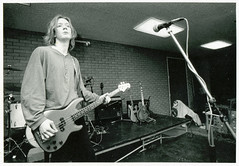
Partly prompted by the fact I’ve been in touch with Simon (vocals/guitar), I’ve converted some of the old recordings into MP3 format and created a “fan” page on Facebook yesterday:
www.facebook.com/pages/The-Headmen/24224123641.
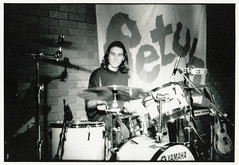
It’ll soon be 20 years since the band formed (t’was in Oct 1989), so maybe we’ll reform for the anniversary? 😉
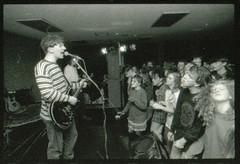
ALA 2008
Just in case anyone’s not already spotted it, Owen Stephens is doing a fantastic job of blogging ALA 2008.
I’ve been pondering trying to organise a UK library unconference for a while now, but haven’t progressed it any further than the “pipe dream” stage. I wonder if I could persuade Kathryn Greenhill to immigrate to the UK? 😉
Anyway, if a UK library unconference/barcamp/hackfest style event is of interest to you, make sure you leave a comment on Owen’s “Mashed Libraries? Would you be interested?” thread.